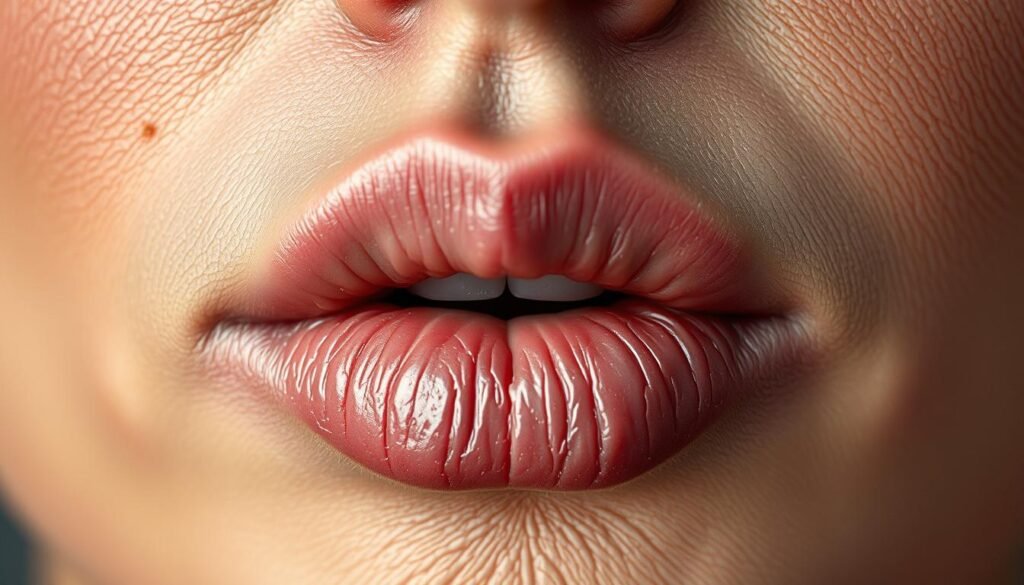Did you know over 85% of people face acne at one point? For many, usual treatments don’t work well. That’s where isotretinoin, or Accutane, comes in. It’s a strong medication for severe acne, when other treatments fail or aren’t suitable. Knowing the side effects is key for anyone thinking of using it.
We’ll look into isotretinoin’s world, including how it works and its success in treating acne. We’ll also cover both common and serious side effects. This knowledge is crucial for patients and caregivers to make informed choices about this treatment.
Key Takeaways
- Isotretinoin is a powerful option for treating severe acne.
- The medication comes with a range of potential side effects, necessitating careful monitoring.
- Women must have multiple pregnancy tests to prevent severe birth defects associated with isotretinoin.
- Side effects may include skin dryness, mood changes, and even eye problems.
- Regular consultations with a healthcare provider are essential during treatment.
Introduction to Isotretinoin
Isotretinoin is a type of retinoid medication, which comes from vitamin A. It’s very effective against severe acne. This is true especially when other treatments don’t work well. Common brands include Absorica, Amnesteem, and Claravis. About 9.4% of people worldwide are affected by acne vulgaris. This shows a big need for effective acne treatments.
The usual dose of isotretinoin goes from 0.5 to 2 mg per kg of body weight daily. This depends on the person’s condition and how they respond to the treatment. It’s critical to talk with a healthcare provider about your medical history before starting isotretinoin. This drug carries big risks, especially for pregnant women. It can cause serious birth defects if used during pregnancy.
Most people taking isotretinoin will face side effects like dry skin and chapped lips. They might also experience lower back pain, muscle aches, and stomach issues. Checking your health often while on this medication is key. This helps deal with any negative reactions and improves the treatment experience.
For more info on isotretinoin, check out this resource. Learning about isotretinoin’s benefits and risks helps in making wise choices for treating severe acne.
How Isotretinoin Works
Isotretinoin is a strong option for severe acne. It shrinks and slows down sebaceous glands, which are key to acne. When these glands calm down, your skin isn’t as oily. This helps in reducing and preventing acne.
This medication works in several ways. It reduces oil production and speeds up skin cell turnover. This action helps keep pores clear. Patients usually start with a dose of 0.5 mg/kg per day. Sometimes, the dose can go up to 1.0 mg/kg per day. The treatment lasts about 15 to 20 weeks for the best results.
Isotretinoin is different from other acne solutions. It targets sebaceous glands and helps with skin renewal. This treatment is ideal for severe cases of acne that haven’t responded to other treatments. It’s also used for other skin conditions not officially approved by the FDA.
In short, isotretinoin is a valuable option for tough acne. It tackles both existing acne and helps prevent new spots from forming. This makes it an essential part of acne management.
Effectiveness as an Acne Treatment
Isotretinoin is a powerful acne remedy, backed by many clinical studies. It’s the top choice for battling severe acne like cystic and nodular types. Those hard-to-treat cases often see remarkable success. Most patients see their skin clear up entirely after finishing their treatment.
This medicine works by cutting down sebum production drastically. Studies show it can reduce sebum by about 90% in six weeks at a certain dosage. This huge drop helps improve the skin. It reduces the factors that cause acne and the inflammation it brings.
People usually find their acne gone after four to six months of using isotretinoin. Half of the users stay clear of acne long-term, skipping further treatments. But, it’s important to keep an eye on one’s health while on it. The European Directive advises regular checks on liver and lipid levels.
Isotretinoin stands out because it tackles all main acne triggers. It minimizes sebaceous glands, unclogs pores, battles acne bacteria, and soothes inflammation. That’s why it’s still seen as the best treatment for severe acne.
If you’re looking to combat acne triggers like stress, check out this helpful resource. It offers advice on managing acne with different strategies.
Overview of Common Side Effects
Isotretinoin is a strong medication for severe acne. It has common side effects. Knowing about these effects helps patients deal with them better during treatment.
Dry Skin and Lip Cracking
Dry skin is a common issue with isotretinoin, causing discomfort. This dryness can also affect the lips, leading to painful cracking. A good skincare routine, including moisturizers and lip balms, helps lessen these problems.
Nausea and Muscle Pain
Nausea and muscle pain are frequent during treatment. These symptoms can be mild but might interrupt daily life. Drinking plenty of water and eating small meals helps with nausea. It’s critical to talk to a doctor if the discomfort doesn’t go away.
Eye and Vision Changes
Changes in the eyes, like dryness and irritation, are possible. These issues can cause discomfort for many people on isotretinoin. Artificial tears can offer relief for these symptoms.

| Side Effect | Description | Management Tips |
|---|---|---|
| Dry Skin | Skin may feel tight and rough. | Use moisturizers regularly. |
| Lip Cracking | Chapped lips can lead to discomfort. | Apply lip balm frequently. |
| Nausea | Can cause discomfort and loss of appetite. | Stay hydrated and eat small meals. |
| Muscle Pain | Aches may affect daily activities. | Discuss pain relief options with a doctor. |
| Eye Changes | May include irritation and dryness. | Use artificial tears as needed. |
Isotretinoin (Accutane): Side Effects
Isotretinoin is also known as Accutane. It is famous for its ability to fight acne, but it also has serious side effects. Everyone thinking about taking it should know about the health risks.
Severe Birth Defects and Pregnancy Risks
The risk of severe birth defects is very alarming with isotretinoin. Women who take it during pregnancy can face huge risks. This includes things like birth defects, miscarriages, and early births. That’s why women who can have children must follow the iPLEDGE REMS program’s rules about birth control.
Psychological Effects: Depression and Suicidal Thoughts
The mental effects of isotretinoin are serious. In 2005, the FDA warned that it could make depression and suicidal thoughts more likely. Many patients have felt mental health struggles. So, doctors should check a patient’s mental health before starting treatment.
Increased Risk of Inflammatory Bowel Disease
Isotretinoin can also increase the risk of inflammatory bowel disease. Patients have reported stomach issues that might lead to long-term problems. It is important to talk openly with your doctor if you have these symptoms.
Liver Damage Concerns
There’s also a risk of liver damage from isotretinoin. It can affect your liver and increase cholesterol, making regular blood tests to check liver health necessary. Safe use of isotretinoin needs close attention from doctors while on it.
| Side Effect | Description | Monitoring Required |
|---|---|---|
| Severe Birth Defects | Risk of congenital disabilities if taken during pregnancy | Mandatory pregnancy testing and contraception adherence |
| Depression Risk | Potential for increased suicidal thoughts | Regular mental health evaluations |
| Inflammatory Bowel Disease | Gastrointestinal issues connected to medication use | Prompt evaluation of any digestive symptoms |
| Liver Damage | Possible hepatotoxic effects and hypertriglyceridemia | Routine blood tests to assess liver function |
Managing Side Effects While in Treatment
Patients on isotretinoin deal with several side effects. It’s important to manage dry skin and watch mental health closely. This helps make the treatment successful.
Strategies for Dry Skin Relief
Dry skin is a common issue with isotretinoin, causing discomfort. Patients can ease this by:
- Using lightweight, non-comedogenic moisturizers after washing to keep skin moist.
- Adding a humidifier to rooms to cut down on dry air.
- Drinking lots of water to stay hydrated inside out.
- Steering clear of hot water and rough soaps that make skin drier.
- Applying lip balm often to help with dry lips.
Monitoring Mental Health
It’s crucial to watch your mood while on isotretinoin. Though skin may improve, mood changes can occur. Keeping regular check-ins with your doctor helps catch any mental health issues early. It’s key to:
- Talk about any mood changes or emotional issues with your doctor.
- Lean on friends or family for support if you notice signs of depression.
- Look for help like counseling or support groups to stay mentally strong.

Long-Term Benefits of Isotretinoin
Isotretinoin’s long-term benefits go beyond clear skin. Those treated often see better life quality. Clear skin boosts self-esteem, improves social life, and enhances mental health.
Clearer Skin and Improved Quality of Life
The effects of isotretinoin bring clearer skin that lasts. It eases stress and lifts self-image. A boost in self-esteem makes socializing easier and more fun.
Preventing Future Acne Scarring
Isotretinoin also prevents acne scars. It keeps the skin smooth by dealing with breakouts early. This helps avoid scars that acne can leave behind.
| Benefit | Description |
|---|---|
| Clearer Skin | Long-term improvement leading to reduced anxiety over appearance and increased confidence. |
| Improved Quality of Life | Enhanced self-esteem and more fulfilling social interactions. |
| Preventing Acne Scarring | Effective reduction in the risks of scarring from past acne outbreaks. |
Alternatives to Isotretinoin
Isotretinoin is a strong acne treatment. But, people looking for other options have several. These alternatives could work well but might be safer. Talking to a dermatologist can help pick the right treatment for you.
Other Acne Treatments
There are other acne treatments with fewer side effects than isotretinoin. Some common options include:
- Topical Retinoids: Products like Retin-A, Tazorac, and Differin offer benefits with less risk.
- Oral Antibiotics: Doxycycline can fight acne by tackling bacterial infections.
- Hormonal Therapies: Spironolactone works well for hormonal acne in adult women.
- Corticosteroids: They can ease severe inflammation pain.
- Laser Treatments: Accure laser and photodynamic therapy are precise and have minor side effects.
Comparative Efficacy
Knowing how effective these treatments are helps in making good choices. The summary below compares their effectiveness and side effects against isotretinoin:
| Treatment | Effectiveness | Common Side Effects |
|---|---|---|
| Isotretinoin | Very high for severe cases | Dry skin, joint pain, severe birth defects |
| Topical Retinoids | Moderate to high | Skin irritation, redness |
| Oral Antibiotics | Moderate | Digestive issues, sun sensitivity |
| Spironolactone | High for hormonal acne | Menstrual irregularities, dizziness |
| Accure Laser | High | Temporary redness, swelling |
| Photodynamic Therapy | High | Skin peeling, redness |
What to Expect During Treatment
When you start isotretinoin treatment, it’s vital to know a few key things. You must have regular check-ups to watch how the treatment works and catch any side effects early. In the beginning, your skin might actually get worse for a month or two before it starts to get better. It’s tough, but it’s expected.
The treatment usually goes on for 15 to 20 weeks. By the third month, most people see a big difference. In fact, by the fourth month, some even see their skin clear up completely. It’s important to stick with the treatment plan your doctor gives you.
If you’re a woman who could have a baby, you need to be really careful about not getting pregnant. This means using two kinds of birth control from one month before you start isotretinoin, during the treatment, and for one month after you end it. You also have to do a pregnancy test every month.
Isotretinoin is great at treating severe acne, but it can have side effects. More than 1 in 100 people might experience skin dryness, sensitivity to the sun, or dryness in the mouth and other areas. If you notice big changes in your mood, unusual bruising, or stomach issues, you need to see a doctor right away. Be careful with any medicines or supplements that might not mix well with isotretinoin.
Some people, especially those with diabetes, need to watch certain health measures closely. Changes in mood or behavior are also possible. If you notice anything worrying, talk to a health professional soon.
| Aspect | Details |
|---|---|
| Initial Effects | Skin may worsen before improving. |
| Duration | Typically lasts 15 to 20 weeks. |
| Significant Improvement | Expected by the third month. |
| Contraception Requirement | Two forms of birth control required. |
| Monitoring | Regular check-ups and pregnancy tests necessary. |
Consulting with Your Healthcare Provider
Before starting treatment with isotretinoin, talking to a healthcare provider is crucial. This talk helps patients understand the medication’s risks and benefits. It’s smart to make a list of questions about the treatment, side effects, and safety steps.
Questions to Ask Before Starting Treatment
Talking openly with the healthcare provider helps patients cover important questions to ask. Key questions include:
- What side effects might I encounter?
- Is isotretinoin right for me, given my health history?
- What should I know about pregnancy and birth control while on this treatment?
- How will you track my treatment’s progress?
- Do I need to make any lifestyle changes while taking isotretinoin?
Importance of Regular Monitoring
Regular monitoring is vital during isotretinoin therapy to ensure it’s safe and working. Patients need monthly check-ups for blood tests and to check liver and lipid levels. This helps manage side effects and keep treatment on track. Women will also have pregnancy tests to follow safety rules.

Conclusion
Isotretinoin, also known as Accutane, is strong and works well for tough acne. It makes the skin clearer and improves life quality. Yet, it’s key to remember it can have side effects.
Dry lips and very rare issues like muscle damage show why close doctor care is vital. It’s best to talk openly with doctors to deal well with isotretinoin. Knowing the good and bad helps make smart choices.
To get more info on treating acne, check out recent acne studies here.
Isotretinoin is a good option for bad acne but needs care to reduce risks. By working with doctors, patients start treatment knowing its benefits and risks.